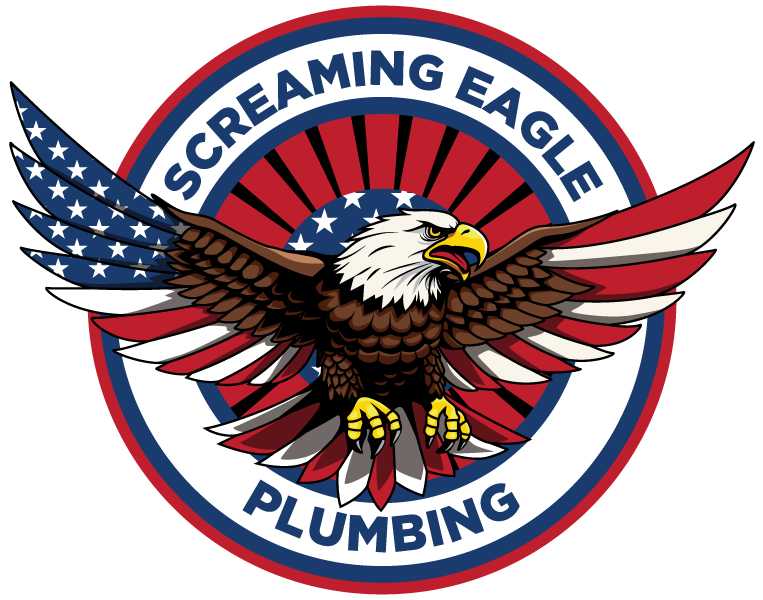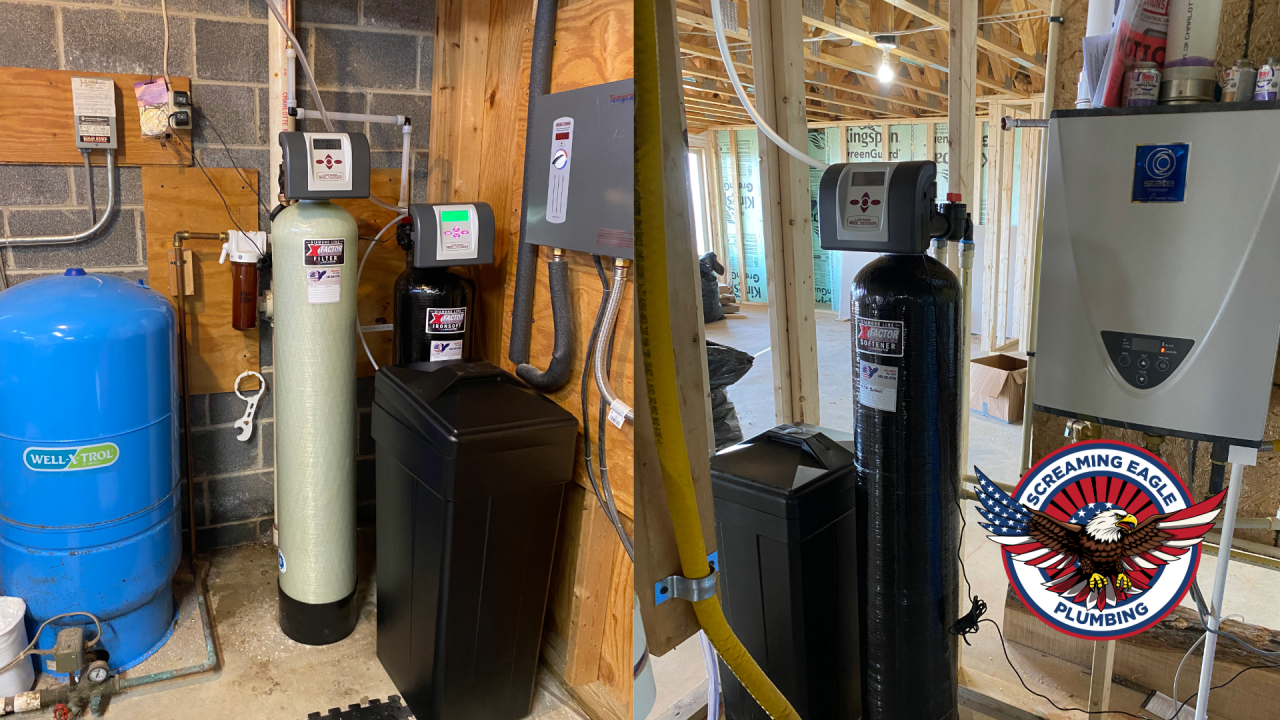Whole House Water Treatment Systems for Greater Warrenton, Virginia
Supplying clean and healthy water is essential for every household, especially in places like Greater Warrenton, Virginia, where water quality can vary.
Screaming Eagle Plumbing is a Veteran Owned & Operated company that provides top-notch water treatment solutions.
This guide addresses the ten most frequently asked questions about water treatment systems, helping you make informed decisions about your home’s tap water quality.
1. What is a Water Treatment System and How Does It Work?
Definition:
A water treatment system is designed to remove contaminants from your water supply, making it safe and clean. Such systems may employ different technologies such as filtration, softening, or reverse osmosis, which are each meant for specific types of pollutants.
Functionality:
Water treatment systems pass the liquid through various stages where different impurities are filtered out. For instance, a reverse osmosis system forces fluid through a semipermeable membrane to get rid of dirt, while softeners replace hard minerals with sodium ions, thereby making it softer.
2. Do I Need a Water Treatment System for My Home?
Indicators:
Installing a water treatment system might be necessary if you notice signs like hard water, unpleasant taste, or odors coming from your taps. Additionally, testing its quality may show the presence of dangerous substances that must be dealt with through proper treatments.
Benefits:
Installing such equipment improves the health and safety of drinking water in homes, making it suitable for consumption, cooking, and bathing.
Moreover, this helps improve overall quality throughout all points in households and prevents appliances from scaling caused by hardening minerals.
3. What Types of Water Treatment Systems Are Available?
System Types:
There exist several kinds of water treatment systems designed to perform different functions, such as:
- Water Softeners: are meant to reduce hard minerals like calcium and magnesium, which cause water hardness.
- Water Filters: Remove various contaminants, including chlorine, sediment, or certain heavy metals.
- Reverse Osmosis Systems: For high-level purification by removing up to 99% of impurities.
- UV Purifiers: Chemical-free ultraviolet light kills bacteria and viruses.
Suitability:
The choice of an appropriate system largely depends on specific requirements about the quality of your supply.
In case you have bacteriological problems, then UV purifiers would be most suitable, while homes having issues related to the presence of hardening minerals might require installation softeners only but not limited to those alone when it comes to filtration systems that can remove different kinds of pollutants at once
System-Specific Removals:
Various systems remove different pollutants. An example is the reverse osmosis system that eliminates dissolved salts and heavy metals, while UV purifiers kill microorganisms.
Here are 20 of the most common contaminants found in untreated water:
- Lead
- Mercury
- Arsenic
- Chlorine
- Nitrates
- Pesticides
- Herbicides
- E. coli
- Coliform bacteria
- Cryptosporidium
- Giardia
- PFAS (Per- and Polyfluoroalkyl substances)
- Radon
- Fluoride
- Benzene
- Iron
- Manganese
- Sulfates
- Total Dissolved Solids (TDS)
- Volatile Organic Compounds (VOCs)
These contaminants can pose significant health risks, making water treatment essential for safe consumption.
6. What is the Cost of a Water Treatment System?
Factors Affecting Cost:
The cost of water treatment systems depends on their type, capacity, and complexity, among other factors. Generally, whole-house water treatments are more expensive than point-of-use units since they treat all the water entering your house.
Additional Costs:
When budgeting for a water treatment system, consider other expenses like installation fees, maintenance costs (including replacing filters), and necessary parts replacements (e.g., pumps).
You should regularly service your unit so that it always works properly; however, different types may require different levels of servicing due to size or design considerations.
7. How Often Do I Need To Maintain Or Replace Parts In My Water Treatment System?
Maintenance Frequency:
Different systems have varied maintenance requirements. For instance, salt pellets should be replenished monthly in most softeners, whereas RO filters need replacement once every year or six months, depending on usage rates.
Replacement Parts:
Some components, such as membranes and filters, need to be replaced often if you want your gadget to function optimally throughout its life span; otherwise, there might occur some problems with quality standards not being met, thus leading to complaints from consumers, which could eventually result into loss revenue for companies involved in this line of business plus tarnishing their reputation at large scale hence affecting sales negatively too over the period covered by the warranty offered initially during the purchase process.
8. Can a Water Treatment System Improve Water Taste and Odor?
Taste & Odor Improvement:
Absolutely! Numerous water treatment systems are specifically designed to improve the taste and odor of water. Activated carbon filters, for instance, can eliminate chlorine, which has an unpleasant smell, and other chemicals responsible for bad tastes and smells in drinking water.
Common Causes:
Chlorine, sulfur compounds, and organic matter are the most common causes of bad taste or smell coming from taps.
It is essential to choose the right type of treatment system depending on what specific problem one wants to be addressed in their household supply because failure to do so will result in individuals not being satisfied with the outcome.
9. What is the Difference Between a Water Softener and a Water Filter?
Comparison:
- Water Softener: A device used primarily for removing hard minerals like calcium and magnesium, which cause scale buildup inside pipes or appliances such as dishwashers, washing machines, etc.
- Water Filter: This equipment focuses on eliminating contaminants, including, but not limited to, chlorine, sediment particles larger than a few microns in diameter (which can make your drink look dirty), and heavy metals like lead/mercury ions, among others, thereby improving purity levels in terms of taste.
Use Cases:
In some instances where there are high levels of hardness combined with impurities found within plumbing networks serving buildings, it may be necessary to have both types working together since they complement each other’s functions hence giving more comprehensive results during the treatment process adopted by various establishments involved herein for ensuring that all necessary precautions have been taken against any future occurrence related with this matter.
10. Is Professional Installation Required for Water Treatment Systems?
Installation Considerations:
The complexity of water treatment systems varies; hence, while some, like countertop filters, need no expert knowledge to fix them onto faucets at home, others, such as whole-house units or reverse osmosis systems, may require professional help for successful installation.
This guarantees correct setup, leading to maximum efficiency and a long lifespan.
Wrong connections can significantly affect performance and cause faults later on.
In addition, only trained personnel can test these gadgets after they are assembled, ensuring that they work effectively to treat your supply.
Wrap-up
Clean, safe drinking water is a must-have for Greater Warrenton, VA homeowners.
Let Screaming Eagle Plumbing, Veteran-Owned and operated, assist you in choosing the right water treatment system for your specific needs!
Whether you are dealing with hard water issues or contaminants or simply looking to enhance the taste and smell of your tap water, our knowledgeable staff will help you make an informed decision about what type of unit best suits your home’s requirements.
Call us today at 540-305-9799 to schedule a phone consultation or submit a request online.

